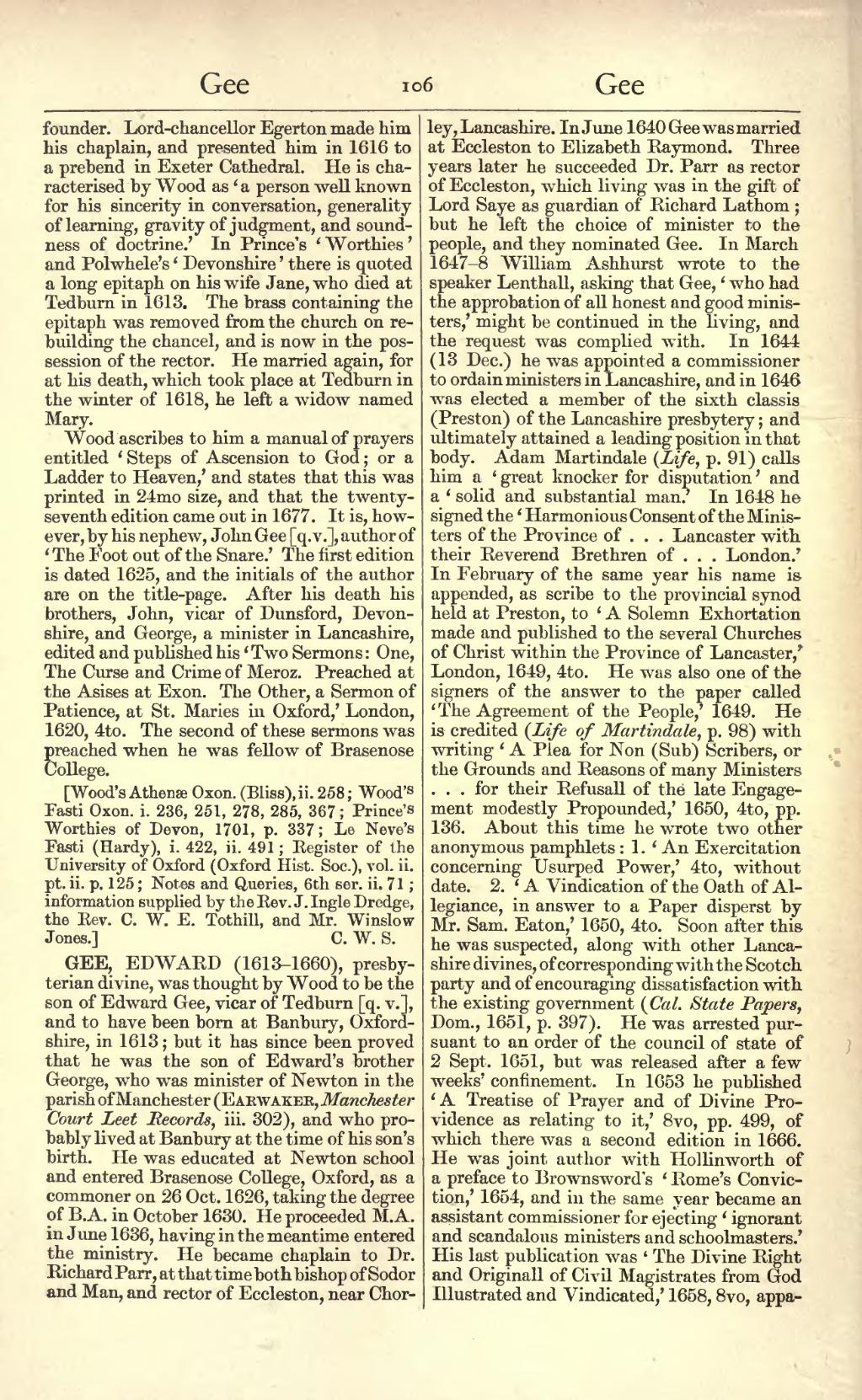founder. Lord-chancellor Egerton made him his chaplain, and presented him in 1616 to a prebend in Exeter Cathedral. He is characterised by Wood as ‘a person well known for his sincerity in conversation, generality of learning, gravity of judgment, and soundness of doctrine.’ In Prince's ‘Worthies’ and Polwhele's ‘Devonshire’ there is quoted a long epitaph on his wife Jane, who died at Tedburn in 1613. The brass containing the epitaph was removed from the church on rebuilding the chancel, and is now in the possession of the rector. He married again, for at his death, which took place at Tedburn in the winter of 1618, he left a widow named Mary.
Wood ascribes to him a manual of prayers entitled ‘Steps of Ascension to God; or a Ladder to Heaven,’ and states that this was printed in 24mo size, and that the twenty-seventh edition came out in 1677. It is, however, by his nephew, John Gee [q. v.], author of ‘The Foot out of the Snare.’ The first edition is dated 1625, and the initials of the author are on the title-page. After his death his brothers, John, vicar of Dunsford, Devonshire, and George, a minister in Lancashire, edited and published his ‘Two Sermons: One, The Curse and Crime of Meroz. Preached at the Asises at Exon. The Other, a Sermon of Patience, at St. Maries in Oxford,’ London, 1620, 4to. The second of these sermons was preached when he was fellow of Brasenose College.
[Wood's Athenæ Oxon. (Bliss), ii. 258; Wood's Fasti Oxon. i. 236, 251, 278, 285, 367; Prince's Worthies of Devon, 1701, p. 337; Le Neve's Fasti (Hardy), i. 422, ii. 491; Register of the University of Oxford (Oxford Hist. Soc.), vol. ii. pt. ii. p. 125; Notes and Queries, 6th ser. ii. 71; information supplied by the Rev. J. Ingle Dredge, the Rev. C. W. E. Tothill, and Mr. Winslow Jones.]
GEE, EDWARD (1613–1660), presbyterian divine, was thought by Wood to be the son of Edward Gee, vicar of Tedburn [q. v.], and to have been born at Banbury, Oxfordshire, in 1613; but it has since been proved that he was the son of Edward's brother George, who was minister of Newton in the parish of Manchester (Earwaker, Manchester Court Leet Records, iii. 302), and who probably lived at Banbury at the time of his son's birth. He was educated at Newton school and entered Brasenose College, Oxford, as a commoner on 26 Oct. 1626, taking the degree of B.A. in October 1630. He proceeded M.A. in June 1636, having in the meantime entered the ministry. He became chaplain to Dr. Richard Parr, at that time both bishop of Sodor and Man, and rector of Eccleston, near Chorley, Lancashire. In June 1640 Gee was married at Eccleston to Elizabeth Raymond. Three years later he succeeded Dr. Parr as rector of Eccleston, which living was in the gift of Lord Saye as guardian of Richard Lathom; but he left the choice of minister to the people, and they nominated Gee. In March 1647–8 William Ashhurst wrote to the speaker Lenthall, asking that Gee, ‘who had the approbation of all honest and good ministers,’ might be continued in the living, and the request was complied with. In 1644 (13 Dec.) he was appointed a commissioner to ordain ministers in Lancashire, and in 1646 was elected a member of the sixth classis (Preston) of the Lancashire presbytery; and ultimately attained a leading position in that body. Adam Martindale (Life, p. 91) calls him a ‘great knocker for disputation’ and a ‘solid and substantial man.’ In 1648 he signed the ‘Harmonious Consent of the Ministers of the Province of … Lancaster with their Reverend Brethren of … London.’ In February of the same year his name is appended, as scribe to the provincial synod held at Preston, to ‘A Solemn Exhortation made and published to the several Churches of Christ within the Province of Lancaster,’ London, 1649, 4to. He was also one of the signers of the answer to the paper called ‘The Agreement of the People,’ 1649. He is credited (Life of Martindale, p. 98) with writing ‘A Plea for Non (Sub) Scribers, or the Grounds and Reasons of many Ministers … for their Refusall of the late Engagement modestly Propounded,’ 1650, 4to, pp. 136. About this time he wrote two other anonymous pamphlets: 1. ‘An Exercitation concerning Usurped Power,’ 4to, without date. 2. ‘A Vindication of the Oath of Allegiance, in answer to a Paper disperst by Mr. Sam. Eaton,’ 1650, 4to. Soon after this he was suspected, along with other Lancashire divines, of corresponding with the Scotch party and of encouraging dissatisfaction with the existing government (Cal. State Papers, Dom., 1651, p. 397). He was arrested pursuant to an order of the council of state of 2 Sept. 1651, but was released after a few weeks' confinement. In 1653 he published ‘A Treatise of Prayer and of Divine Providence as relating to it,’ 8vo, pp. 499, of which there was a second edition in 1666. He was joint author with Hollinworth of a preface to Brownsword's ‘Rome's Conviction,’ 1654, and in the same year became an assistant commissioner for ejecting ‘ignorant and scandalous ministers and schoolmasters.’ His last publication was ‘The Divine Right and Originall of Civil Magistrates from God Illustrated and Vindicated,’ 1658, 8vo, appa-
